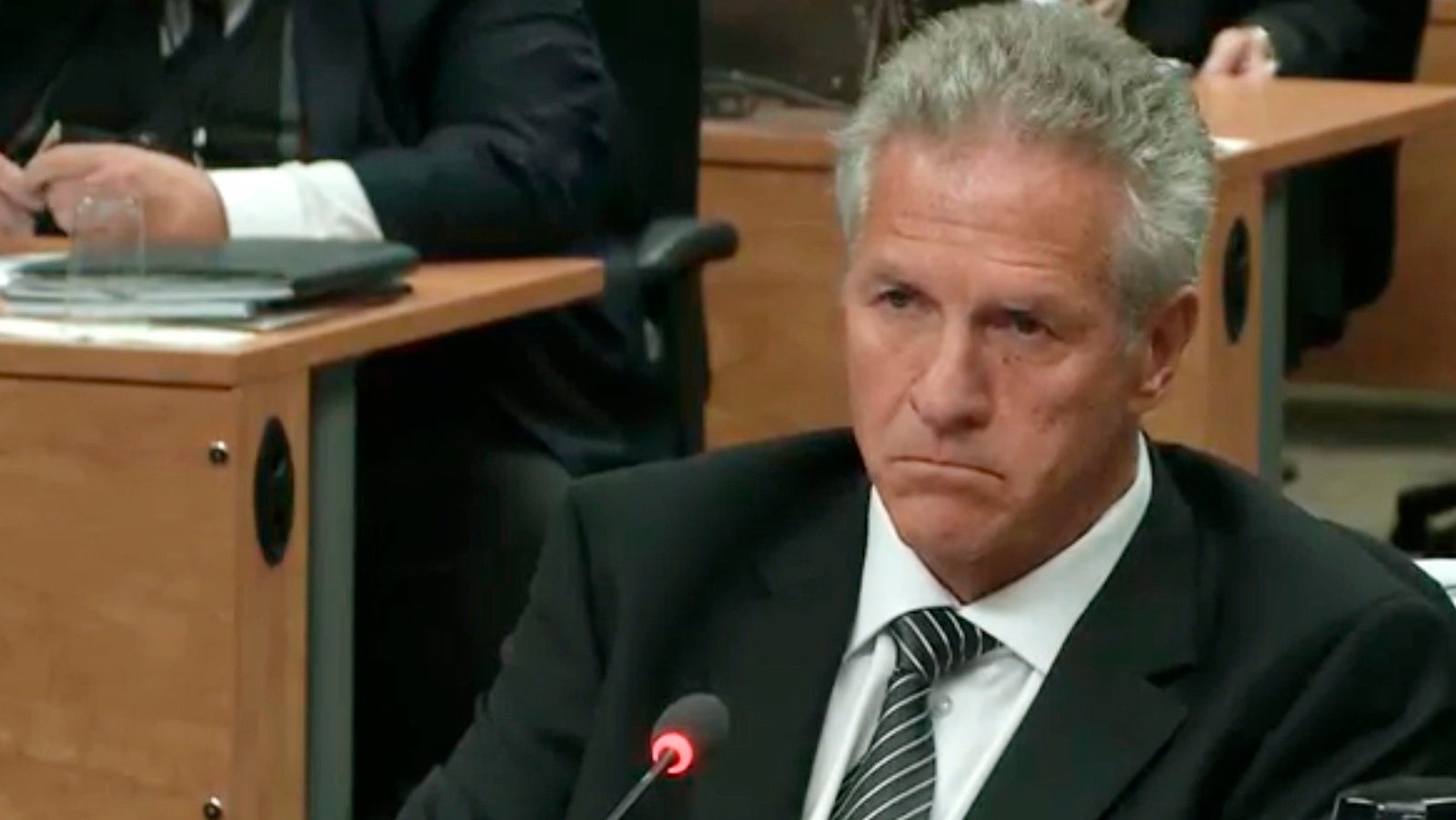Tony Accurso confirms Rizzuto Mob links at Charbonneau inquiry
Two days and one incredible admission as the Quebec construction magnate is finally forced to take the stand
Construction magnate Tony Accurso is seen on an image taken off a television monitor at the Charbonneau inquiry looking into corruption in the Quebec construction industry Wednesday, September 3, 2014 in Montreal. THE CANADIAN PRESS/Paul Chiasson
Share

Tony Accurso didn’t want to open his mouth in public. Before yesterday, journalists and archivists would have had trouble splicing together 10 seconds of the Quebec construction magnate, political power broker and suspected Mob associate talking about anything, much less how he came to rule over the building of this province’s infrastructure for the better part of three decades. He went to three courts (Superior, Appeal, Supreme) to avoid having to divulge the open secret of his ascendancy in front of the Charbonneau inquiry into corruption in the province’s construction industry, all for naught. He ran out of tricks, and was forced to spill.
It’s made for an odd two days, and one incredible admission. Within hours we were treated to the Accurso Scowl—last seen when he was arrested on fraud and breach of trust charges in 2012—and the Accurso Grin, last seen from an undated photo in which he and business associate Joe Lombard literally washed the back of union leader Jean Lavallée in the Caribbean Sea.
That image, made public during the commission hearings last January, is the best illustration of Accurso’s business model: befriend and placate the most powerful construction union federation in the province, and you will become rich beyond your dreams.
More on this in a second. First, though, that incredible admission. Today, after years of denying it, Accurso admitted Nick Jr. and Vito Rizzuto, two of the biggest figures in Canadian Mob history, were both what Accurso deemed “petits contacts” (minor contacts) whose phone numbers he kept in his iPhone.
With that one declaration, Accurso has put an end to the shabby conceit that the Mob doesn’t have its fingers wrapped around the neck of this province’s construction industry. I heard from two different sources that Accurso’s legal stalling was less about incriminating himself than raising the Mob’s ire by testifying about the construction industry, the Mob’s biggest plum. Maybe his admission of ties to the Rizzutos was a slip of his tongue. Or maybe his admission came because Montreal’s Mob is in such severe disarray, and both Vito and Nick Jr. (and Nick Sr., for that matter) are dead.
But back to that worse-held secret, that Tony Accurso was so successful because he is effectively a creation of organized labour. Until the early ’80s, Accurso’s construction company, Louisbourg Construction, was but one amongst many on the Quebec landscape. As La Presse’s Daphné Cameron and Kathleen Lévesque noted in a recent fascinating profile of the man, Louisbourg was started by Accurso’s father, Vincenzo Accurso, in 1954 and serviced the Montreal area.
Accurso fils had a wee bit more ambition than his dad. He had the good sense to make friends with Louis Laberge, president of the Quebec Labour Federation (known as FTQ, its French acronym), and, later, with Jean Lavallée, who led the province’s largest electricians union and was the long-time president of FTQ-Construction. Laberge and Lavallée took Accurso under their collective wing; through the Fonds FTQ, the union federation’s financing arm, they funnelled loans to the smallish Louisbourg when the risk-adverse banks wouldn’t. “Mr. Laberge protected his friends,” Accurso testified yesterday.
And how. In order to ensure that their investment in Accurso succeeded, Laberge et al. provided him with labour. The relationship was win-win for both the FTQ and Accurso: the union saw huge dividends from its investment, and Accurso’s business interests grew exponentially.
By 2012, Accurso and his children, Jimmy and Lisa, controlled 63 construction and real estate companies, according to an analysis by the province’s anti-corruption squad. That same year, as La Presse reported, Accurso received upwards of 80 per cent of the public sector construction contracts in the province.
“With the FTQ and Accurso, it wasn’t just money, but manpower,” Jacques Duchesneau told me in 2012. “The FTQ invested in him, and in order to get a return on their investment, they made sure that Accurso got the manpower he needed.” Today, Accurso testified that he has been friends with nearly every FTQ president since Laberge. Clearly, he knew that friendship has its privileges.
The legacy of these cozy relationships between organized labour and the Mafia is before us today. For more than three decades, until he sold many of his interests last year, Accurso’s empire has had a quasi-monopoly over public, taxpayer-funded contracts. Coincidence or not, this exact period is marked by the increased presence of organized crime in the industry.
On his boat, appropriately named Touch, Accurso entertained a raft of union types and politicians—namely former Montreal executive committee president Frank Zampino, who was on Touch at the very moment the city was negotiating a $356-million water-metre contract. Who ended up getting said contract? A consortium of companies, including an Accurso construction company. (Thankfully, the contract was eventually scuttled for being “too fast, too big, too expensive,” according to a 2010 Montreal auditor’s report.)
Accurso is facing fraud, breach of trust, conspiracy, tax evasion and corruption charges. Though he certainly isn’t penniless, he is no longer in the business that he professes to love. He even had to sell his boat. Even he has to admit, though: it’s been a hell of a run.